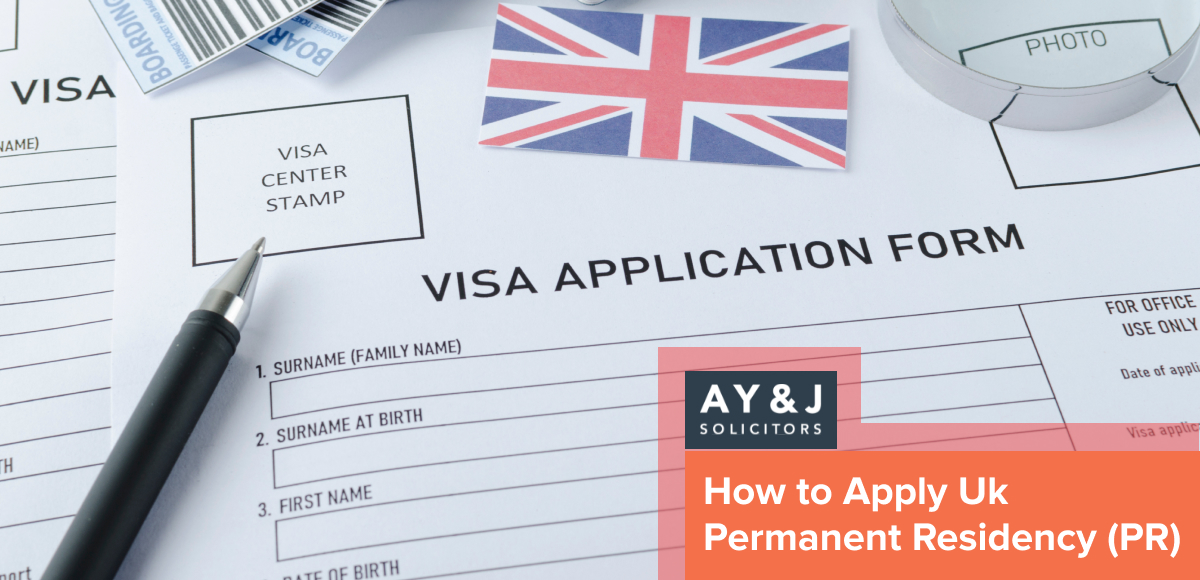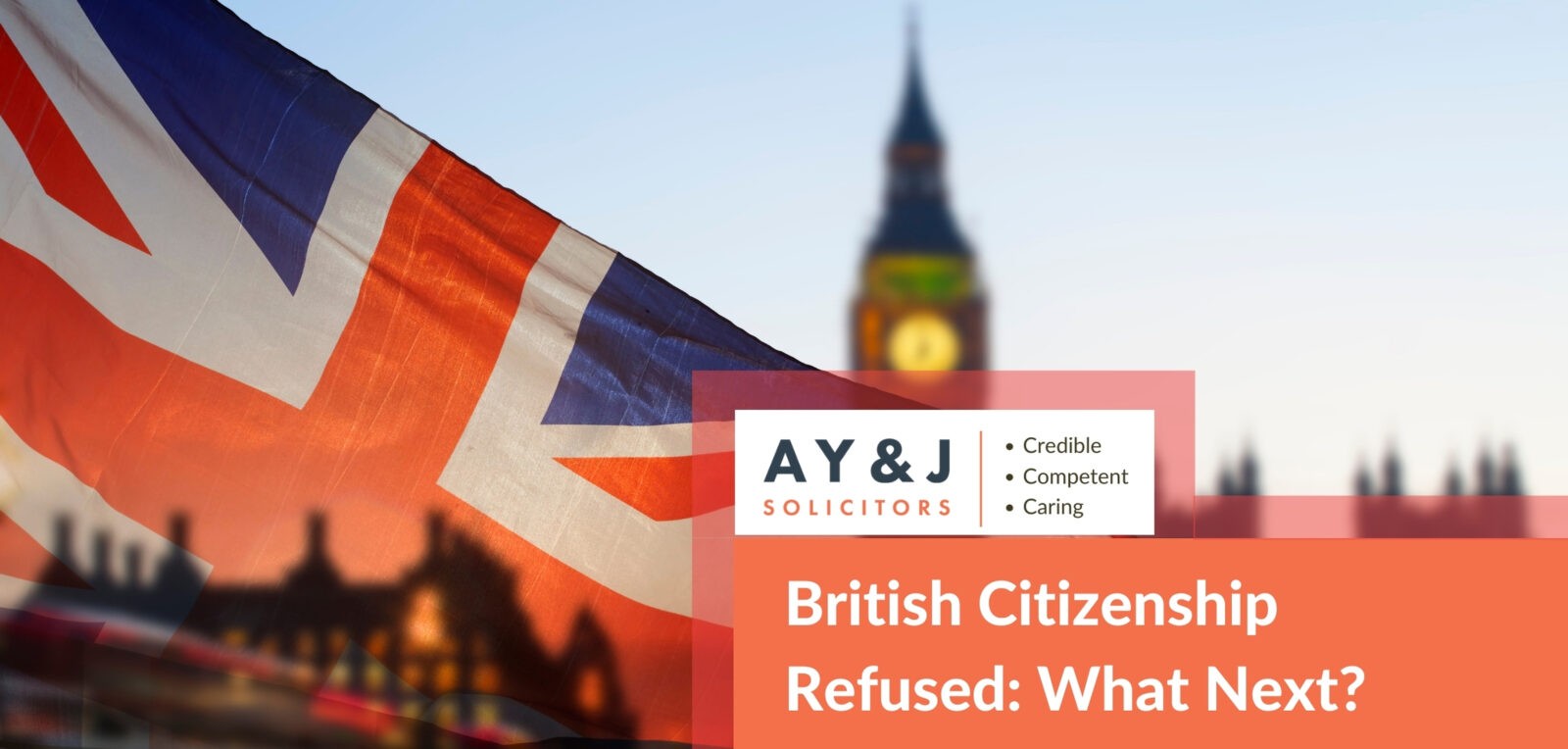Disclaimer: The information in this blog is accurate as of its publication date. Any updates after that date are not reflected here.
Permanent Residence in the UK is officially known as Indefinite Leave to Remain (ILR), a key milestone for anyone looking to make the UK their permanent home. If you’re planning to apply for UK Permanent Residence, this guide explains how to get PR in the UK, the UK PR requirements, and what to expect during the application process.
Table of Contents
Quick Facts – Apply for UK Permanent Residence
- Who qualifies: Skilled workers, Innovator Founders, family members, and EU nationals
- Processing time: Up to 12 months
- Key tests: Life in the UK test and English language requirement
- Typical fee: £3,029 per applicant
At AY&J Solicitors, we are an SRA-regulated firm, recommended by The Legal 500, with over 5,000 successful immigration cases. Our experienced team assists clients with Indefinite Leave to Remain (ILR) and British citizenship applications, offering professional guidance at every step. If you need support with your UK permanent residence or citizenship application, our experts are here to help.
How to Get PR in the UK
Permanent Residence (PR) in the UK, officially known as Indefinite Leave to Remain (ILR), allows you to live, work, and study in the UK without time restrictions. When you apply for UK permanent residence, you’re taking a big step toward becoming a British citizen, confirming that you’ve built strong ties with the country and now wish to settle here for the long term.
Some routes to PR are faster than others. For example, certain Global Talent and Innovator Founder visa holders can qualify after 3 years, while most other visa categories require 5 years or longer of continuous residence.
Top quick answers:
- Easiest way to get PR in the UK: Usually through the Skilled Worker or Family route (depending on personal circumstances).
- Ways to get PR in the UK: Work, business, family, EU Settlement, or long residence.
- When can I apply for PR in the UK: Typically after 5 years of lawful residence (3 years for some categories, 10 for long residence).
UK PR Eligibility – Who Is Eligible to Apply for UK Permanent Residence?
To understand how to get PR in the UK, it helps to know which routes lead to settlement. Below is a quick overview of common visa types, PR timelines, and UK PR requirements:
| Route | PR Eligibility Timeline | Core Requirements | Key Tests |
| Skilled Worker | 5 years | Continuous lawful residence, minimum salary threshold, no more than 180 days’ absence per 12 months | English (B1) + Life in the UK |
| Global Talent | 3 or 5 years | Endorsement from approved body, contribution in qualifying field, continuous residence | English (B1) + Life in the UK |
| Innovator Founder | 3 years | Business endorsement, growth and job creation criteria, continuous residence | English (B1) + Life in the UK |
| Family Routes | 5 or 10 years | Genuine relationship, financial and cohabitation evidence, limited absences | English (B1) + Life in the UK |
| Long Residence | 10 years | Continuous lawful stay across visas, absences within limits | English (B1) + Life in the UK |
This table should help you quickly see what is PR in the UK and how each route leads to ILR.
PR in the UK as a Family Member of a Settled Person or UK Citizen
If your spouse, partner, parent, or child is permanently settled in the UK, you may qualify for PR under the Family route. The following explains the requirements for applying as a partner or spouse with a family visa or as a dependent of a person with a work visa.
Applying as a partner with a family visa – For those who currently hold a family visa as a partner or spouse, it may be possible to apply for PR if you have lived in the UK continuously for the required period (i.e. 2 or 5 years). This will depend on the route stated on your ‘leave to remain’ letter from the Home Office. To qualify, you must:
- Have lived together since you last renewed your visa and intend to continue your relationship after you apply
- Have a combined income of at least £41,700 a year.
- Have passed the Knowledge of Life in the UK test and
- Meet the English language requirements (at least level B1 in speaking and listening or a degree taught or researched in English).
Applying as a partner as a dependent of a work visa holder – You may be eligible for PR as a dependent on your partner’s work visa. If your partner holds either a dependant on a UK Ancestry or a Representative of an Overseas Business visa, there is no time in the UK requirement. Dependants of those on a different type of work visa (e.g. a Skilled Worker visa) must have been continuously resident in the UK for at least 5 years. Continuous residence means that you have spent no more than 180 days outside the UK in any 12-month period.
If you are considering PR as a parent, child, or adult dependant relative, speak to a member of our immigration law team for full details of the eligibility requirements.
Timeline overview:
- 5-year route: For partners meeting all financial and English requirements.
- 10-year route: For partners who cannot meet the financial threshold but can show compassionate or human rights grounds.
Financial Requirement
You must show a combined income of at least £41,700 per year (based on April 2024 updates). Income can come from employment, self-employment, or savings above £88,500.
Relationship and Cohabitation Evidence
You’ll need to provide:
- Proof you’ve lived together continuously since your last visa renewal.
- Joint bank statements, tenancy or mortgage documents.
- Correspondence showing shared address and ongoing relationship.
If you meet these UK PR requirements, you can apply for permanent residence UK as a family member.
Apply for Permanent Residence UK via Work
Several work visas lead directly to PR in the UK, such as the Skilled Worker visa, Global Talent visa, Health and Care Worker visa, and Scale-up visa.
Skilled Worker Route
To qualify for ILR under the Skilled Worker category, you must:
- Have lived and worked in the UK for at least 5 continuous years.
- Check the Salary Thresholds – For Skilled Worker applications and ILR salary checks, the current standard salary threshold is £41,700 per year (based on a 37.5-hour week) or the going rate for your SOC code, whichever is higher. If the job is listed on the Immigration Salary List, different thresholds may apply.
- Spend no more than 180 days outside the UK in any 12-month period.
- Pass the English language and Life in the UK tests.
| Requirement | Detail |
| Qualifying Period | 5 years |
| Salary Rule | £41,700 or going rate |
| Absence Limit | 180 days per 12 months |
| Occupation Codes | Must remain on eligible list |
| Tests | English (B1) + Life in the UK |
Global Talent Route
The Global Talent visa offers a faster route to PR — often in 3 years if you are endorsed as a leader, or 5 years if endorsed as a potential leader.
Approved endorsing bodies include Tech Nation, Arts Council England, and the Royal Society. Applicants must show evidence of sustained achievements in their field and continuous residence in the UK.
Scale-up and Innovator Founder Routes
Scale-up visa holders can qualify for ILR after 5 years, provided they remain employed in a qualifying role and meet the minimum earnings requirement during the first 6 months.
Innovator Founder visa holders can apply for ILR after 3 years by meeting business endorsement and growth benchmarks such as job creation, investment, or market expansion.
If you need guidance on how to apply for PR in the UK or understanding the UK PR process, our legal team can help ensure your application is error-free and meets all Home Office standards.
AY&J Solicitors are an SRA-regulated law firm, recommended by The Legal 500, with experience handling over 5,000 successful immigration cases, including ILR and British citizenship applications.
Get UK permanent residence via Your Business
For entrepreneurs and business owners, the Innovator Founder visa offers a pathway to PR. This visa is designed for those with an innovative business idea and provides a fast track to permanent residency after just three years, provided certain criteria are met. Specifically, you must have:
- Resided in the UK for at least 3 years on an Innovator Founder or Innovator visa (you cannot include time spent in the UK using any other visa type)
- A new endorsement showing that you have met the requirements for growing your business and
- Not spent more than 180 days outside the UK in any 12 months.
UK PR status for EU nationals
EU nationals who lived in the UK before the end of the Brexit transition period at the end of 2020 can apply for ‘settled status’ under the EU Settlement Scheme (EUSS). This scheme allows EU citizens and their families to obtain PR after five years of continuous residence in the UK. EU nationals who started living in the UK before the cut-off of 31st December 2020 but have been here for less than 5 years can apply for ‘pre-settled status’, allowing them to remain until they are eligible for full settled status. Settled Status under the EU Settlement Scheme is permanent residence.
How to apply for UK Permanent Residence
Applying for UK PR involves several steps, as explained below:
- Check your eligibility – Before applying for PR, ensure you meet the eligibility criteria for your specific category. It is important not to apply too early as you risk your application being refused.
- Gather any evidence required to support your application – Gather all necessary documents, including proof of identity, continuous residence, English language test pass certificate, Life in the UK test pass certificate, and any additional requirements specific to your visa category.
- Prepare and submit your application – Complete the online application form and pay the application fee.
- Biometric appointment – Book and attend an appointment at a UK Visa and Citizenship Application Services (UKVCAS) service point to provide your biometric information (your fingerprints and a photo) and
- Wait for a Decision – Wait for a decision from the Home Office.
You can apply for PR 28 days before you are eligible. In most cases, you can include your partner and children on the same PR application form as long as they meet the eligibility requirements.
UK Permanent Residence Rules You Should Meet
Continuous residence
To qualify for PR, you must meet the continuous residence rule. This generally means you must have lived in the UK for a continuous period of five years, with no absences exceeding 180 days in any 12-month period. If you are unsure if you meet the continuous residence rule, please speak to a member of our team. We will help you to gather the information necessary to correctly calculate your length of continuous residence in the UK.
Life in the UK test
Applicants for UK PR aged between 18 and 65 also need to pass the Life in the UK test. This is a test provided by approved test providers to assess whether applicants have sufficient knowledge of the UK and British culture.
Good Character
Applicants must demonstrate good character, which includes having no serious criminal convictions and adhering to UK laws and regulations.
Documents Required to Apply for UK Permanent Residence
When you apply for UK permanent residence, you must provide a set of documents that prove your identity, residence, finances, and eligibility under your chosen route.
Below is a grouped checklist of common UK PR requirements to help you prepare.
1. Identity Documents
- Current passport or travel document for all applicants, including dependants.
- Any previous passports covering your stay in the UK.
- Biometric Residence Permit (BRP) or visa vignette (if applicable).
2. Proof of Residence in the UK
- Utility bills, tenancy agreements, council tax, or mortgage statements showing your UK address.
- Official letters from employers, banks, or government agencies confirming your residence.
- Travel history evidence such as entry and exit records or a Border Force summary, proving continuous residence under UK permanent residence rules.
3. Financial and Employment Evidence
- Payslips, bank statements, or business accounts showing employment or self-employment income.
- Tax returns (P60, SA302, or HMRC statements) for each qualifying year.
- For dependants, include proof of financial dependency or shared household expenses.
4. Relationship Documents (if applicable)
- Marriage or civil partnership certificate for spouse/partner applications.
- Birth certificates for child dependants.
- Joint financial documents such as shared bank statements or tenancy agreements to prove ongoing cohabitation.
5. Business or Endorsement Evidence
- Endorsement letter from an approved body (for Innovator Founder or Global Talent routes).
- Business plan, growth reports, or investment proof where relevant.
- Company registration and accounts if applying through a business route.
Uploading Documents via UKVCAS
When completing your UK PR application, all supporting documents must be uploaded online via UKVCAS (UK Visa and Citizenship Application Services).
- Upload clear, legible scans in PDF, JPEG, or PNG format.
- Avoid blurred or cropped images.
- Keep file names simple and descriptive (for example, “Payslips_May2025.pdf”).
- If applying with dependants, make sure each dependent’s documents are uploaded under their name.
Meeting the document checklist in full helps ensure your UK PR process runs smoothly and avoids unnecessary delays or refusals.
What is the processing time and cost of UK PR?
The processing time for a UK PR application typically ranges from six to twelve months, depending on the complexity of the case and the visa category. The cost of UK PR is made up of the application fee plus any legal fees if professional guidance is sought. The current PR application fee is £3,029.
| Cost Component | Approximate Amount | Notes |
| UK PR (Indefinite Leave to Remain) fee | £3,029 | Main Home Office fee per applicant from April 2025 |
| Life in the UK Test | ~£50 | Test fee varies by provider |
| English Language Test (B1 level) | ~£150 | Varies by provider and provider location |
| UKVCAS / Biometric appointment | Varies (some free) | Dependent on service centre/add-ons |
| Priority processing (if eligible) | ~£500 additional | For faster decision, where route allows |
| Super Priority processing (if eligible) | ~£1,000 additional | Decision by next working day possible |
Standard decisions for UK permanent residence applications take up to 6 months. Complex cases or document verifications can extend the timeline to 12 months or more. Priority and super priority services may be available for quicker processing, though availability depends on the visa route and Home Office capacity.
What are the benefits of getting UK PR?
Obtaining PR in the UK provides considerable advantages, including:
- Work freedom: No employer sponsorship required once you apply for UK permanent residence. You can change jobs freely or start your own business.
- Family stability: Live permanently in the UK with your family without reapplying for visas.
- Access to public services: Enjoy access to NHS healthcare and public benefits without paying the immigration healthcare surcharge.
- Education opportunities: Pay home tuition fees and qualify for student funding at UK universities.
- Travel and re-entry: Travel freely to and from the UK, provided you don’t stay abroad for over 2 years.
- Pathway to citizenship: You can apply for British citizenship 12 months after obtaining UK permanent residence.
Other ways to get PR in the UK
Apart from the primary routes mentioned, there are other ways to achieve PR in the UK; these include the following:
- Ancestry Visa: For Commonwealth citizens with a UK-born grandparent who meet UK PR requirements after 5 years of residence.
- Long Residence: After 10 years of continuous lawful stay in the UK under UK permanent residence rules.
- Refugee or Humanitarian Protection / Discretionary Leave: Eligible after 5 or 6 years of residence, depending on leave type.
- Returning Residents: For those who previously had ILR and wish to regain permanent status after a long absence.
- Serving Armed Forces Members: Eligible under specific residence and service conditions.
How can I get Permanent Residency in the UK after my studies?
If you are an international student in the UK, you can transition to PR by securing a graduate visa, which will allow you to stay in the UK for two years (three years for PhD graduates) after completing your studies. Once you have found suitable skilled work with a sponsor licence holder, you can switch to a Skilled Worker visa or another eligible work visa during your Graduate visa period. Once you have lived in the UK on an eligible visa for five years, you can then apply for PR. There are other ways to secure PR after your studies, including through the family visa route.
Is it difficult to get PR after studies?
Not necessarily. The key is choosing the right visa route after graduation, maintaining continuous lawful residence, and ensuring compliance with all conditions. Strong employment history and good character improve your success chances when you apply for UK permanent residence.
Self-Sponsorship route UK
The self‑sponsorship route is a flexible way for overseas nationals to apply for permanent residence UK without needing an employer sponsor. It allows you to establish a UK company, obtain a Sponsor Licence, and sponsor yourself under the Skilled Worker Visa. This route avoids the need to apply for jobs and work for an employer. It is particularly popular with self‑employed consultants (e.g., IT consultants) who wish to work for themselves in the UK and appreciate the transparent Self Sponsorship cost. Learn more about the Self‑Sponsorship Visa Route, including Self Sponsorship cost, by watching this detailed video.
Self-sponsorship entails:
- Setting up a business in the UK (i.e. finding a business address, opening a bank account, and registering with Companies House and HMRC).
- Applying for a sponsor licence work visa
- Issuing a Certificate of Sponsorship
- Applying for a Skilled Worker visa
Once on a Skilled Worker visa, holders can apply for PR after five years of continuous residence in the UK. Still not convinced? Watch this engaging video where Yash debunks the myths surrounding the Self-Sponsorship Visa Route.
For more details on the self-sponsorship route requirements in the UK, please contact a member of our specialist business immigration team, who will be glad to assist you .
Final words
At AY&J, we understand more than most that securing permanent residence in the UK is a significant milestone for many overseas nationals. Whether through family connections, employment, business, or as an EU national, understanding the eligibility requirements and application process for UK PR is crucial. With the right preparation and guidance, you can successfully navigate the journey towards UK PR, enjoying the benefits and opportunities that come with it.
Still confused about what visa route to take or unable to find a visa route? Get a free assessment with one of our experts at AY&J Solicitors.
Frequently Asked Questions
1. What is UK Permanent Residence and how is it different from British citizenship?
UK Permanent Residence, officially known as Indefinite Leave to Remain (ILR), allows you to live and work in the UK without time limits. However, it’s not the same as British citizenship. PR holders cannot vote or hold a UK passport, and they risk losing their status if they stay abroad for over two years. British citizenship offers a UK passport, full political rights, and lifelong status that cannot lapse due to absence.
| Aspect | PR (ILR) | Citizenship |
| Travel limit | Up to 2 years abroad | No limit |
| Voting rights | No | Yes |
| UK passport | No | Yes |
| Risk of losing status | Yes (after 2 years) | No |
| Next step | Can apply for citizenship after 12 months | N/A |
2. What are the easiest ways to get UK Permanent Residence (PR)?
The easiest ways to gain UK Permanent Residence depend on your skills and visa category.
- Global Talent Visa (3 years): Ideal for high-achieving professionals in tech, arts, or research who hold a UK endorsement.
- Innovator Founder Visa (3 years): For entrepreneurs running a genuinely innovative, endorsed business in the UK.
- Skilled Worker Visa (5 years): For employees in sponsored jobs earning at least £41,700 or the occupation’s going rate.
Each path requires continuous residence, lawful stay, and evidence of compliance.
3. When can I apply for UK PR?
You can apply for UK Permanent Residence (ILR) once you’ve completed your qualifying period — usually five years for most work routes or three years for Global Talent and Innovator Founder visas. Applications can be submitted up to 28 days before reaching that date. Absences must stay under 180 days in any 12-month period.
Example: If your Skilled Worker visa began on 1 October 2020, you can apply for PR from 3 September 2025 onwards.
4. What are the most common reasons for ILR refusal and how can I avoid them?
Refusals for Indefinite Leave to Remain usually happen for five avoidable reasons:
- Miscalculating your five-year qualifying period.
- Spending more than 180 days outside the UK.
- Salary or role not matching visa conditions.
- Incomplete or inconsistent documentation.
- Failing the good-character requirement.
Avoid refusal by checking residence dates carefully, keeping proof of earnings, submitting full evidence, and seeking legal review before applying.
5. How can I maintain my PR status and avoid losing ILR?
Your UK Permanent Residence (ILR) can lapse if you stay outside the UK for over two consecutive years. To return later, you’ll need to re-apply as a Returning Resident and prove your ties to the UK. Maintain your status by visiting the UK regularly, keeping a valid UK address, filing tax returns, and preserving bank or property links. These actions show ongoing residence and help safeguard your permanent status.
6. What are the complete costs involved in applying for UK Permanent Residence (PR)?
The total cost for UK Permanent Residence depends on your route and service options. As of October 2025, the Home Office fee is £3,029 per applicant. Add roughly £50 for the Life in the UK test, £150 for the English test, and up to £200 for biometric appointments. Optional faster services cost £500 (priority) or £1,000 (super-priority).
Example: A Skilled Worker applying with standard tests pays around £3,729 in total.
| Cost component | Approx. amount |
| ILR application fee | £3,029 |
| Life in the UK test | £50 |
| English test (B1) | £150 |
| UKVCAS appointment | £0–£200 |
| Priority processing | £500 (optional) |
| Super-priority service | £1,000 (optional) |










